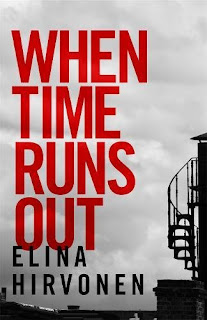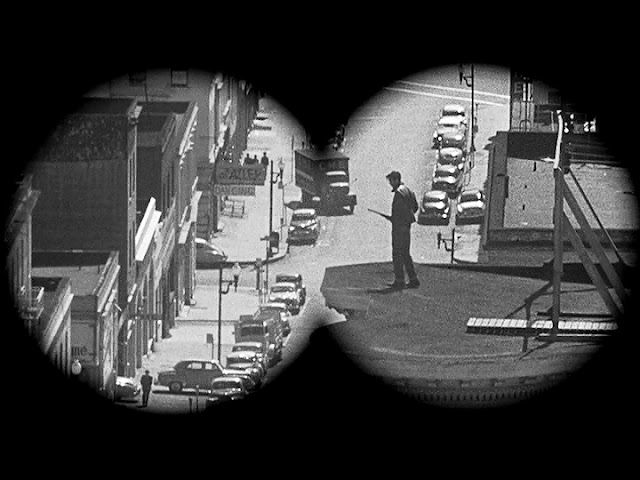At last I
have identified the whispering voice that encouraged me throughout my
reading of When
Time Runs Out.
It took a day after I read Finnish author Elina Hirvonen's short
novel to understand just how this voice was able to mitigate the
novel's grim implications, allowing its dreary narratives to hold me
captive without a scintilla of hope promising an affirmative
conclusion.
The voice
was Walker Percy’s, and the leavening it offered was the message of
Percy’s quasi-satiric apocalyptic novel Love
in the Ruins.
I should have caught on at the start, as each novel begins with a man
and a rifle on a high spot overlooking a kill zone. Both men see
themselves responding to a society at the verge collapse. Other than
this single notion they’ve essentially nothing else in common.
The novels
themselves offer moments of humor. In Ruins,
the humor is sly, in keeping with Percy’s naturally droll take on
human foibles. But the laughs in Time
are unfortunate and inadvertent (I presume), occurring only with the
sniper’s name, Aslak, which tickled my giggle trigger every time I
came upon it, hearing my earworm imitate that annoying TV duck trying
to sell me some sort of insurance--paradoxically an icon of the
commercial quackery Aslak blames for his stand on the Helsinki
rooftop with his rifle. Ultimately it’s Percy’s more insightful
understanding of human nature that sets Ruins
apart from the myopic surface tension driving the Finnish novel.
We see
Aslak through three lenses:
his self-perception and in the minds of his mother and older sibling.
None seem aware Aslak, who is twenty-seven on the day he becomes a
sniper, clearly is autistic. Neither the word nor a diagnosis
pointing to the neurological disorder is ever mentioned, despite his
parents having taken him to various therapists in his early years. No
one gets past the obvious conclusion something is “wrong” with
him. Eventually Aslak turns this wrongness around and pins it on
society:
I am drowning in this shit.
Everything is polluted. The whole of Western culture is just one
hedonistic performance. The civilization we’re so proud of died a
long time ago. Our only religion is the belief that we have the right
to everything we want. The only human right is the human’s right to
consume. That right destroys everything.
A crowning
irony in this statement, part of a diatribe he delivered in a video
police made while communicating with him on the rooftop, is how
closely these ideas mirror those of his environmentalist mother,
Laura, whose lectures warn of commercialism’s threat to the planet.
Yet, she holds out hope:
What
looks now like an inevitable move towards the destruction of humanity
may develop in unexpected directions. We may create versions of the
future,
imagine alternative worlds,
new visions;
one of them may one day come true. But we cannot be certain. The
power of humankind may surprise us not only in destructiveness and
selfishness, but also in wisdom, reason and the creation of the new.
His sister,
Aava, who shares their sensibility, has taken a different approach.
She’s become a physician who wanders
the globe administering her skills to people in the direst of Third
World places. She’s in Mogadishu when news arrives of her brother’s
involvement in a worldwide series of random murders its disaffected
loner perpetrators call “gobal genocide,” organized online by a
masquerading right-wing fanatic who claims his aim is the “culling
of the human race until man can live in harmony with nature.”
Aava’s approach is more
personal, trying to “do everything as well as I can, because the
only meaning is in what I can achieve.
“My tears
and my nightmares do not help anyone,” she tells us. “My pain is
the angst of the privileged. The small minority that has grown
accustomed to thinking that dreams can be realized, and if that
doesn’t work, you can demand better.”
Their father, Eerik, is
engaged similarly, constantly traveling worldwide designing projects
to revitalize ruined landscapes into public recreational and cultural
facilities.
Their youthful ideals brought
Laura and Eerik together, and strong sexual attraction united them.
But the primal pooped out and their mutual affection atrophied. Eerik
was away a lot, putting on Laura the greater share of parenting their
two children, which she’d agreed to have only because Eerik wanted
them. She had a two-year intensely physical affair with a lover
described only as a “wiry-haired man.” With her husband remote,
their grown son a stranger and their daughter gone, she’s
miserable.
Of the
three viewpoints we have, Aava’s comes across as the healthiest,
and perhaps the most modern. Yet, it, too, falls short of happiness.
Her relationship with Gerard, a French diplomat’s son, is tepid.
Their sex is more habitual than inspired, meeting merely a temporary
need. She sees no future with him or anyone else, seeing such
long-term matings ending as dismally as her parents’. “I
yearn for another person’s skin and the demands of his touch, not a
life partner,” she says. “The mere thought of couples’ dinners,
date nights or working at a relationship makes me feel ill. I want to
work for starving children, not at a relationship languishing for
lack of passion.”
 |
|
Elina Hirvonen
|
Missing from these people is a
sense of community, even in its most basic form, as a family.
Cohesion is arbitrary, and any semblance of spiritual connection
illusory.
I can’t
tell if this was the author’s intention. If so, she’s captured
what too often seems a general malaise of our time. Yet, all she
offers, via her three vocal characters, is the foggy yearning for
hope. Hope is never indicated beyond material needs, assuming safety, a hot meal, sex, and a sturdy bed. What more does
anyone need? She seems to suggest something else in the epigram that
leads off the first of the novel’s five divisions. It’s by Susan
Sontag from her book Regarding
the Pain of Others:
“Compassion
is an unstable emotion. It needs to be translated into action, or it
withers.”
[For
more Friday's Forgotten Books check the links on Patti
Abbott's unforgettable blog]


This sounds like a very intense book, Mathew. And thought provoking.
ReplyDeleteCold, too, Tracy. I'm not encouraged to read any others by Hirvonen.
Delete